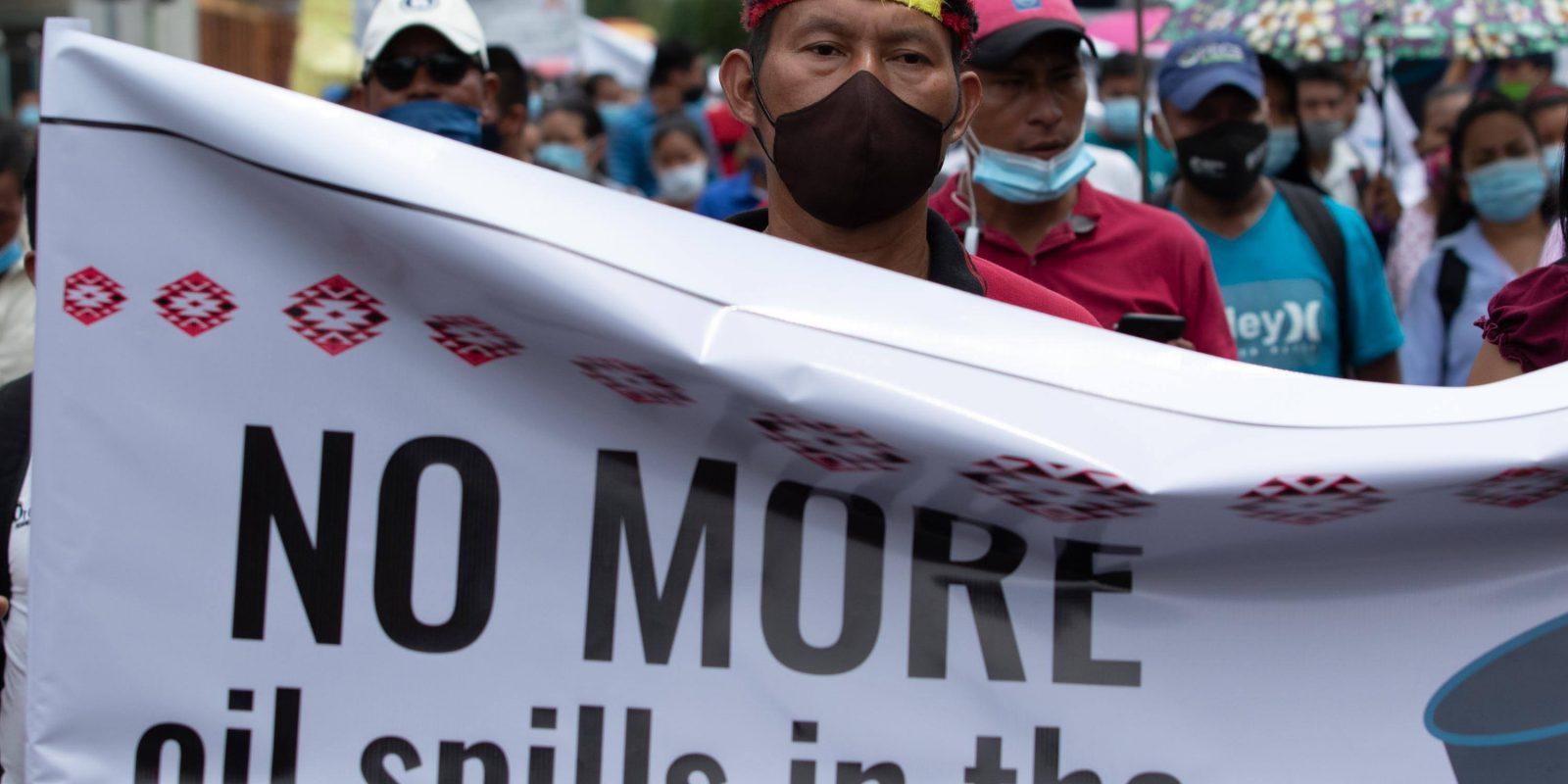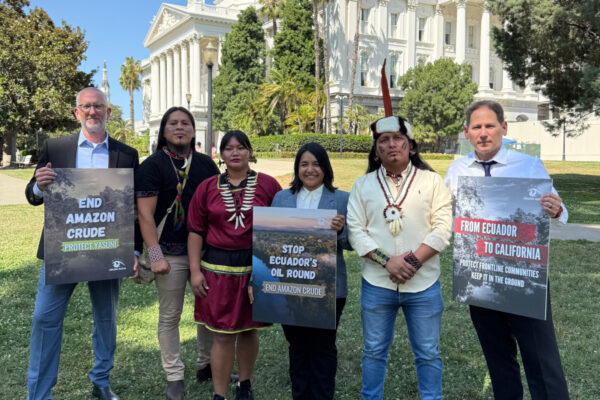“Today’s ruling shows that the Ecuadorian justice system has once again put the interests of oil companies above the rights of Indigenous peoples and nature.”
Carlos Mazabanda, Amazon Watch Ecuador Coordinator
Oil production in the Ecuadorian Amazon came to a halt on April 7th after the rupture of the SOTE and OCP pipelines. The spill was caused by the negligence of the government and oil company operating the pipelines. Both failed to take preventative measures to mitigate the effect of the erosion of the Coca and Napo rivers, which have rapidly increased since the construction of the Coca Codo Sinclair hydroelectric dam.
Over 15,800 barrels of crude and other pollutants were spilled into Amazon rivers and tributaries, affecting approximately 120,000 people that live near the riverbanks of the Coca and Napo – 27,000 of them Indigenous peoples from 105 communities. The life of the Kichwa people in particular was instantly changed because the river is their sole source of water for drinking, bathing, and fishing, and it is a vital part of their local economy. Intense rain after the spill then flooded their communities and contaminated their crops with crude oil.
The pipeline ruptures and its subsequent spill has denied the affected communities’ right to water – an essential part of life – the right to health, their collective Indigenous rights, and the rights of nature, all of which are outlined in the Ecuadorian constitution. This environmental disaster further aggravated the health crisis brought on by the pandemic, because clean water for handwashing is essential in preventing the spread of the virus.
Due to the violation of these rights, the affected communities sought solidarity and support from human rights, religious, and Indigenous organizations. Together they filed a lawsuit demanding a series of protective actions guaranteed by the constitution. The objective was to hold the Ecuadorian government and the companies operating the pipelines, OCP and Ep Petroecuador, accountable because the spill was preventable and would require remediation and restorative measures to restore the rights of those affected.
“As a Kichwa Indigenous woman, I will continue to fight for my people’s rights and lives,” said Veronica Grefa, Kichwa leader and President of Toyuca community. “We demand justice. Our families are still suffering from the disastrous impacts of this spill, and we still don’t have clean water and food. Our communities are united to defend our rivers for future generations.”
The legal process lasted 125 days in the courts of the Orellana province, where the spill occurred. But while communities were dealing with the contamination and seeking emergency relief, the court dragged its feet. After the judge was diagnosed with COVID-19, the court failed to assign someone new to the case, choosing to let the urgent needs of the people languish, and failed to set a date for the trial to resume. Only after international pressure, led by the coalition of human rights and environmental organizations including Amazon Watch, did they set the trial calendar and resume. On August 4th, the affected communities presented another series of requests for precautionary measures to the court. They demanded that the pipelines be shut down given that the regressive erosion of the Coca River is severe and still poses a risk of floods and new spills.
Over the course of the trial, the Ecuadorian government and oil companies presented absurd and misleading claims. Perhaps in light of their poor or non-existent remediation and spill contingency plan, they argued in court that “nature replenishes itself,” downplaying the long-term toxicity and harm that pollution poses for aquatic life and the food chain for local communities. The companies touted the “relief” they provided communities, but the food and three liters of water – the World Health Organization recommends 15 liters during the pandemic – per person per day were not enough. And, according to the communities, the companies pressured people who accepted emergency food and water handouts to waive their right to take legal action. These strategies underscore the industry’s impunity and disdain for Indigenous peoples.
“Once again, we have felt the injustice on the part of the judiciary, since we clearly see that the Ecuadorian government cares more about its income than about the health of the inhabitants, at least of us Kichwas,” said Grefa. “For decades we have supported and sustained the entire country and it is unfair that they treat us this way. It has been clearly demonstrated that there was a spill and that they have violated our rights and privatized the river.”
The affected communities presented their case through first-hand testimonies. The victims and over a dozen social, environmental, and industry experts, used 60 exhibits to show that the government and oil companies knew of the possible risks posed by erosion, and they failed to establish mitigation measures that would have guaranteed the safety of the communities in the event of a spill. Despite the clear arguments and evidence presented, the judge sided with the oil industry and the government, rejecting the communities’ action for emergency protective measures.
The judge read the verdict accepting the arguments of the companies and the government that alleged there are other administrative ways of repairing the wrongs in this case, including the environmental damage. The judge then blamed the victims, going out of his way to accuse the affected communities who brought the suit of abusing the legal system by exercising their legitimate right of enforceability, reparation, and non-repetition. The decision was unprecedented, considering that Ecuador is one of the countries with advanced human rights and rights of nature protections in its constitution.
According to Carlos Mazabanda, Amazon Watch’s Ecuador Coordinator, “Today’s ruling shows that the Ecuadorian justice system has once again put the interests of oil companies above the rights of Indigenous peoples and nature. The evidence of contamination and the impact on the lives of the Kichwa populations of the Coca and Napo rivers was overwhelming during the hearing. However, the judge, without law or logic on his side, denied justice for those affected by the spill who have been waiting for months for meaningful action to remediate and repair the damage. Meanwhile, the river and the lives along it, have changed, perhaps forever.”
And just like that, a case that has addressed one of the most serious environmental disasters in Ecuador of the last fifteen years was dismissed, in a decision that once again casts doubt on the role of a justice system and whether or not oil interests are also subject to accountability. Finally, the judge shut down the hearing abruptly without allowing communities to voice their appeal to the judgment. Afterward, at the FCUNAE headquarters, communities held a press conference, where several leaders expressed that the denial of justice was in and of itself a new rights violation. They questioned the actions of the judge and the role of the governmental institutions that are supposed to guarantee their rights. They reflected on how after 50 years of oil exploitation, the government has failed to improve living conditions, and instead has only brought them pollution. They closed the press conference with a strong message that this fight does not end here, and that it will continue until justice is achieved.
“Despite the overwhelming amount of evidence, today, we have been ignored. As FCUNAE, we reject the tricks of the judge. We will not give up. We will continue our fight. We call on all our brothers to unite and to maintain this fight against the oil company. We say enough looting of our resources, enough to the poverty extractivism has brought us, and enough to contamination,” declared Carlos Jipa, President of FCUNAE.
This case is a beginning, not an end. The message of the Kichwa is clear: enough is enough. And they have pledged to fight until oil companies are held to account – in this case and for the historic toxic legacy of the oil industry in the Ecuadorian Amazon.













